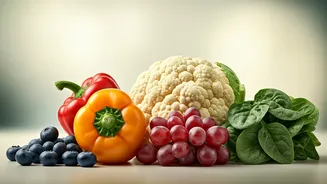Kidneys: Vital Organs
The kidneys play a crucial role in maintaining overall health by filtering waste and excess fluids from the blood. They also regulate blood pressure, produce
hormones, and maintain electrolyte balance. When the kidneys are damaged or not functioning properly, waste products can build up in the body, leading to a range of health issues. Maintaining kidney health is essential to prevent chronic diseases and ensure your body functions at its best. Understanding the importance of kidney function emphasizes the need for proactive measures, especially through diet, to support their optimal performance and overall well-being. Focusing on a kidney-friendly diet can significantly decrease the risk of kidney-related complications. The right dietary choices offer a natural and effective approach to maintaining kidney health.
Beetroot's Kidney Benefit
Beetroot is a nutritional powerhouse that can significantly benefit kidney health. It is rich in antioxidants and phytonutrients that help reduce inflammation and protect the kidneys from damage. Beetroot's compounds contribute to improved kidney function by aiding in the removal of waste products and toxins from the blood. The antioxidants in beetroot combat free radicals, protecting the kidneys from oxidative stress. Moreover, the dietary nitrates in beetroot can enhance blood flow, supporting overall kidney function. Incorporating beetroot into your diet can be a proactive step towards promoting kidney health. Beetroot’s unique composition makes it a valuable addition to any kidney-friendly diet, helping to prevent kidney disease and optimize renal performance.
Cabbage's Detox Effect
Cabbage, with its rich array of vitamins and antioxidants, offers significant benefits for kidney health. This cruciferous vegetable helps detoxify the body by neutralizing harmful substances. Its high fiber content contributes to the removal of waste, which eases the kidneys' workload. Cabbage contains compounds that support liver function, indirectly benefiting the kidneys, as the liver and kidneys work together to filter waste. The presence of phytochemicals in cabbage assists in reducing inflammation. Eating cabbage regularly supports overall kidney health. The versatile nature of cabbage allows for its easy integration into various meals, making it a simple yet effective way to support your kidneys and overall health.
Cranberries' Urinary Support
Cranberries, known for their ability to combat urinary tract infections (UTIs), also indirectly benefit kidney health. UTIs, if left untreated, can lead to kidney infections. Cranberries contain compounds that prevent bacteria from adhering to the urinary tract walls, reducing the risk of infection. By consuming cranberries, you can help reduce the chances of developing UTIs, thus protecting your kidneys from potential damage. The antioxidants in cranberries also provide additional health benefits, supporting overall kidney function. Regular intake of cranberries can contribute significantly to the prevention of kidney-related issues, making it a valuable addition to your dietary choices for kidney health. The natural properties of cranberries make them a proactive choice.
Red Bell Peppers: Antioxidants
Red bell peppers are rich in antioxidants and low in potassium, making them ideal for kidney health. These vibrant vegetables are packed with vitamins, including vitamin C, which is a powerful antioxidant. Antioxidants combat free radicals that can damage kidney cells. The low potassium content in red bell peppers helps reduce strain on the kidneys. Regular consumption of red bell peppers can assist in managing kidney disease and maintain optimal kidney function. The versatility of red bell peppers allows them to be incorporated into various meals, making it easy to enjoy their benefits. Including red bell peppers in your diet is a flavorful and effective way to support your kidney health, making them a nutritious choice.
Cauliflower: Kidney-Friendly
Cauliflower, another member of the cruciferous family, is a beneficial food for maintaining kidney health. It is an excellent source of vitamin C, folate, and fiber, all of which contribute to the body’s overall well-being. The compounds in cauliflower support the detoxification processes, easing the burden on the kidneys. Cauliflower is low in potassium, making it suitable for those with kidney issues. Eating cauliflower regularly can assist in reducing inflammation and promoting a healthy kidney environment. This versatile vegetable can be prepared in many ways, making it a delicious and easily accessible food to support your kidneys. Incorporating cauliflower into your diet is a smart move towards safeguarding and improving your kidney health.




















